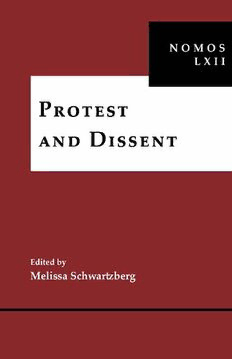Table Of ContentPROTEST AND DISSENT
NOMOS
LXII
NOMOS
Harvard University Press
I Authority 1958, reissued in 1982 by Greenwood Press
The Liberal Arts Press
II Community 1959
III Responsibility 1960
Atherton Press
IV Liberty 1962
V The Public Interest 1962
VI Justice 1963, reissued in 1974
VII Rational Decision 1964
VIII Revolution 1966
IX Equality 1967
X Representation 1968
XI Voluntary Associations 1969
XII Political and Legal Obligation 1970
XIII Privacy 1971
Aldine- Atherton Press
XIV Coercion 1972
Lieber- Atherton Press
XV The Limits of Law 1974
XVI Participation in Politics 1975
New York University Press
XVII Human Nature in Politics 1977
XVIII Due Process 1977
XIX Anarchism 1978
XX Constitutionalism 1979
XXI Compromise in Ethics, Law, and Politics 1979
XXII Property 1980
XXIII Human Rights 1981
XXIV Ethics, Economics, and the Law 1982
XXV Liberal Democracy 1983
XXVI Marxism 1983
XXVII Criminal Justice 1985
XXVIII Justification 1985
XXIX Authority Revisited 1987
XXX Religion, Morality, and the Law 1988
XXXI Markets and Justice 1989
XXXII Majorities and Minorities 1990
XXXIII Compensatory Justice 1991
XXXIV Virtue 1992
XXXV Democratic Community 1993
XXXVI The Rule of Law 1994
XXXVII Theory and Practice 1995
XXXVIII Political Order 1996
XXXIX Ethnicity and Group Rights 1997
XL Integrity and Conscience 1998
XLI Global Justice 1999
XLII Designing Democratic Institutions 2000
XLIII Moral and Political Education 2001
XLIV Child, Family, and State 2002
XLV Secession and Self- Determination 2003
XLVI Political Exclusion and Domination 2004
XLVII Humanitarian Intervention 2005
XLVIII Toleration and Its Limits 2008
XLIX Moral Universalism and Pluralism 2008
L Getting to the Rule of Law 2011
LI Transitional Justice 2012
LII Evolution and Morality 2012
LIII Passions and Emotions 2012
LIV Loyalty 2013
LV Federalism and Subsidiarity 2014
LVI American Conservatism 2016
LVII Immigration, Emigration, and Migration 2017
LVIII Wealth 2017
LIX Compromise 2018
LX Privatization 2018
LXI Political Legitimacy 2019
LXII Protest and Dissent 2020
NOMOS LXII
Yearbook of the American Society for Political and Legal Philosophy
PROTEST AND DISSENT
Edited by
Melissa Schwartzberg
NEW YORK UNIVERSITY PRESS • New York
NEW YORK UNIVERSITY PRESS
New York
www.nyupress.org
© 2020 by New York University
All rights reserved
References to Internet websites (URLs) were accurate at the time of writing.
Neither the author nor New York University Press is responsible for URLs that may
have expired or changed since the manuscript was prepared.
Library of Congress Cataloging-in-Publication Data
Names: Schwartzberg, Melissa, 1975– editor.
Title: Protest and dissent / [edited by] Melissa Schwartzberg.
Description: New York : NYU Press, 2020. | Series: Nomos ; LXII |
Includes bibliographical references and index.
Identifiers: LCCN 2019012041 | ISBN 9781479810512 (cl : alk. paper)
Subjects: LCSH: Protest movements. | Social movements. | Civil disobedience. |
Democracy. | Political culture.
Classification: LCC HM883 .P758 2020 | DDC 303.48/4--dc23
LC record available at https://lccn.loc.gov/2019012041
New York University Press books are printed on acid- free paper, and their binding
materials are chosen for strength and durability. We strive to use environmentally
responsible suppliers and materials to the greatest extent possible in publishing
our books.
Manufactured in the United States of America
10 9 8 7 6 5 4 3 2 1
Also available as an ebook
CONTENTS
Preface ix
Melissa Schwartzberg
Contributors xi
Introduction 1
Melissa Schwartzberg
PART I. JUSTIFYING CIVIL AND
UNCIVIL DISOBEDIENCE
1. Uncivil Disobedience 9
Candice Delmas
2. Disobedience in Black: On Race and Dissent 45
Juliet Hooker
3. The Radical Possibilities of Protest 64
Amna A. Akbar
PART II. THE STRATEGY OF
POLITICAL PROTEST
4. Competing Theories of Nonviolent Politics 83
Karuna Mantena
5. No Justice, No Peace: Uncivil Protest and the Politics
of Confrontation 122
José Medina
6. Protest Fatigue 161
Richard Thompson Ford
vii
viii Contents
7. “No Ways Tired”: An Antidote for Protest Fatigue in the
Trump Era 189
Susan J. Brison
PART III. THE DEMOCRATIC SIGNIFICANCE OF
PROTEST AND DISSENT
8. Defining Nonviolence as a Matter of Law and Politics 201
Tabatha Abu El- Haj
9. On the Strike and Democratic Protest 237
John Medearis
10. Are Protests Good or Bad for Democracy? 269
Susan Stokes
Index 285
PREFACE
MELISSA SCHWARTZBERG
This volume of NOMOS— the sixty- second in the series— emerged
from papers and commentaries given at the annual meeting of the
American Society for Political and Legal Philosophy, held in con-
junction with the annual meeting of the American Political Sci-
ence Association, on August 31, 2017. Our topic, “Protest and Dis-
sent,” was selected by the Society’s membership.
The ASPLP conference consisted of panels organized around
three principal papers and commentaries: (1) “Protest Fatigue:
When Mass Demonstrations Become Routine,” by Richard Thomp-
son Ford, with commentaries from Susan J. Brison and John Med-
earis; (2) “In Defense of Uncivil Disobedience,” by Candice Del-
mas, with commentaries from Juliet Hooker and Amna A. Akbar;
and (3) “Competing Theories of Nonviolent Politics,” Karuna
Mantena, with commentaries from Tabatha Abu El-H aj and José
Medina. The current volume features revised papers from all of
the conference participants, as well as a paper solicited from Susan
Stokes. I am grateful to all of these authors for their excellent con-
tributions. Thanks also to Arina Cocoru and Sam Boren Reast of
New York University for their valuable assistance during the edito-
rial and production phases of this volume.
I wish to thank the editors and production team at New York
University Press, particularly Ilene Kalish, Alexia Traganas, and
Sonia Tsuruoka. On behalf of the ASPLP, I express our gratitude
to the Press for its ongoing support both for the series and for the
tradition of interdisciplinary scholarship that it represents. The
ASPLP is also grateful to Brown University, Duke University, New
York University, and Stanford University for subventions in sup-
port of this and future NOMOS volumes.
Finally, I thank former editor Jack Knight and the members of
the ASPLP council—P resident Stephen Macedo, Vice Presidents
ix

